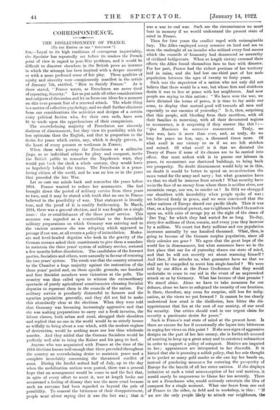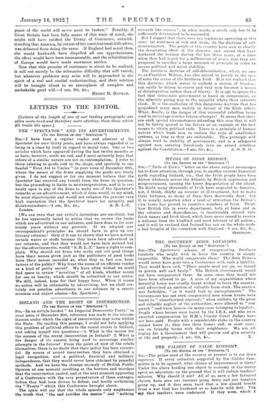CORRESPONDENCE. .
THE DISILLUSIONMENT OF FRANCE.
[TO THE EDITOR OF THE " SPECTATOR."]
STA.—Loyal to its high traditions of courageous impartiality, the Spectator has repeatedly set before its readers the French point of view in regard to post-War problems, and it would be difficult to discover elsewhere in the British press an instance in which the attempt has been inspired with a deeper sincerity or with a more profound sense of fair play. These qualities of equity and sincerity were conspicuously manifest in the article of January 7th, entitled, " How to Satisfy France." As is there stated, " France wants, as Frenchmen are never tired of repeating, Security." Let us put aside all other considerations and subjects of discussion and let us focus our ideas for a moment on this ever-present fear of a renewed attack. The whole thing is a matter of collective psychology, and we shall further eliminate from our considerations the activities and designs of a certain noisy political faction who, for their own ends, have seen fit to trade upon the apprehensions of their compatriots.
The overwhelming majority of Frenchmen are sincerely desirous of_ disarmament, but they view its possibility with far less optimism than the English, and that in proportion to the desire for peace which exists, nay, which is deeply graven, in the heart of every peasant or workman in France.
When those who portray the Frenchman as a militarist jingo, as an individual athirst for glory and conquest, invite the British public to remember the Napoleonic wars, they would put Lack the clock a whole century, they would leave us hopelessly behind the times. The Frenchman is a peace- loving citizen of the world, and he was no less so in the years that preceded the late War.
Let us cast our minds back and remember the years before 1914. France wanted to reduce her armaments. She had brought down the period of military service from three years to two, and it may be stated with truth that no one in France believed in the possibility of war. That statement is literally true, and the proof of it is readily forthcoming. In March, 1914, there was a general election, and it was fought on a single issue : the re-establishment of the three years' service. This measure was regarded as a counterblast to the formidable military preparations on which Germany was entering and to the various measures she was adopting which appeared to presage if not war, at all events a policy of intimidation. Moder- ate and level-headed deputies who took in the gravity of the German menace asked their constituents to give them a mandate to maintain the three years' system of military service, restored a few months before dissolution. The candidates of the forward parties, Socialists and others, were naturally in favour of restoring the two years' system. The result was that the country returned to the Chamber a huge majority against the restoration of the three years' period and, on those specific grounds, one hundred and four Socialist members were victorious at the polls. The country was thus called upon to witness the extraordinary spectacle of purely agricultural constituencies choosing Socialist deputies to represent them in the councils of the nation. For military service is peculiarly distasteful to farmers and the agrarian population generally, and they did not fail to make this abundantly clear at the elections. When they were told that Germany was becoming increasingly aggressive and that she was making preparations to carry out a fresh invasion, the labour classes, both urban and rural, shrugged their shoulders and replied that no one in the world would be so utterly insane as wilfully to bring about a war which, with the modem engines of destruction, would be nothing more nor less than wholesale murder. And they added that the German Socialists would be perfectly well able to bring the Kaiser and his gang to heel.
Anyone who was acquainted with France at the time of the 1914 elections knows well enough that there prevailed throughout the country an overwhelming desire to maintain peace and a complete incredulity concerning the threatened conflict of arms. Dnring the fateful sedond half of July, up to the day when the mobilization notices were posted, there was a general hope that an arrangement would be come to and the fact that, in spite of every effort to avert it, war at length broke out occasioned a feeling of dismay that was the more cruel because such- an outcome had been regarded as beyond the pale of possibility. To conceal the bitterness of their disappointment, people went • about saying that it was the last war ; that it was a war to end war. Such are the circumstances we must bear in memory if we would understand the present state of mind in France.
Then for four years the conflict raged with unimaginable fury. The Allies employed every resource on land and sea to stem the onslaught of an invader who utilized every•foul means which the councils of humanity had denounced as unworthy of civilized belligerents. When at length victory crowned their efforts the Allies found themselves face to face with disaster. For her part, France had the richest portions of her territory laid in ruins, and she had lost one-third part of her male population between the ages of twenty to forty years.
Such was the experience of a nation who not only did not believe that there would be a war, but whose firm and stubborn desire it was to live at peace with her neighbours. And now people are saying to this nation : " We have won the war, we have dictated the terms of peace, it is time to lay aside our arms, to display that mutual good will towards all men and especially to our enemies of yesterday." Is it, then, surprising that this people, still bleeding from their sacrifices, with all their families in mourning, with all their devastated regions to reconstruct, is it surprising if they answer like this ? :— " Que Messieurs les assassins commencent. Truly, we hate war, hate it more than ever, and, as truly, do we long for peace no less, nay, a thousand times more. Of what avail is our victory to us if we are left stricken and ruined. Of what avail is it that we dictated the Treaty of Peace if none of its clauses are to be carried into effect. Our most ardent wish is to pursue our labours in peace, to reconstruct our shattered buildings, to bring back our prosperity. No doubt disarmament would help us in this, no doubt it would be better to spend on reconstruction the sums voted for the army and navy ; but what guarantee have we that we shall be immune from attack ? What security have we in the face of an enemy from whom there is neither river, nor mountain range, nor sea, to sunder us ? In 1914 we shrugged our shoulders with incredulity when people spoke of war ; we believed firmly in peace, and we were convinced that the other nations of Europe shared our pacific ideals. Then it was that, on a hypocritical pretext, our neighbours hurled themselves upon us, with cries of savage joy at the sight of the dawn of ' Der Tag,' for which they had waited for so long. To-day, sixty-five millions of them remain, and every year they increase by a million. We count but forty millions and our population increases annually by one hundred thousand. What, then, is going to become of the German surplus population, since all their colonies are gone ? We agree that the great hope of the world lies in disarmament, but what assurance have we in the first place that our foe of yesterday shares our state of mind, and that he will not secretly set about rearming himself ? And then, if he attacks us, what guarantee have we that we shall not be compelled to resist him single-handed ? We were told by our Allies at the Peace Conference that they would undertake to come to our aid in the event of an unprovoked attack on us by Germany. What has become of that promise ? We stand alone. Alone we have to take measures for our defence, alone we have to safeguard the security of our frontiers. Is there, therefore, any room for surprise, still less for indig- nation, at the views we put forward ? It cannot be too clearly understood how cruel is the disillusion, how bitter the dis- appointment that lies at the root of our anxiety, of our need for security. Our critics should read in our urgent claim for security a passionate desire for peace."
Such is France's real state of mind at the present hour. Is there no excuse for her if occasionally she lapses into bitterness in urging her views on this point ? If she sees signs of aggressive designs on the part of her late enemy, she is forthwith accused of wanting to keep up a great army and to construct submarines in order to support a policy of conquest. Motives are imputed to her ; appearances are interpreted to her discredit. It is hinted that she is pursuing a selfish policy, that her sole thought is to pocket as many gold marks as she can lay her hands on, instead of pondering measures for restoring the presperity of Europe for the benefit-of all her sister nations. If she displays irritation at such a total misconception of her real motives, it would surely be ungenerous to blame her too severely. There is not a Frenchman who. would seriously entertain the idea of conquest for a single moment. What one hears from one end of France to the other, in field and in workshop, is this : "If we are• the only people likely to- attack our neighbours, the
peace of the world will never more be broken." Possibly, if Great Britain had been fully aware of this state of mind, she might still have ratified the Treaty of Guarantee, notwith- standing that America, by reason of her constitutional difficulties, was debarred from doing the same. If England had acted thus, she would forthwith have dispelled all our apprehensions, the effect would have been immeasurable, and the rehabilitation of Europe would have made enormous strides.
Now that this promise of assistance is about to be realized, it will not merely be the submarine difficulty that will vanish, but whatever problems may arise will be approached in the spirit of a real and cordial understanding, and their solution will be brought about in an atmosphere of complete and unshakable good will.—I am, Sir, &c.,
HENRY D. DAVRAY.



































 Previous page
Previous page